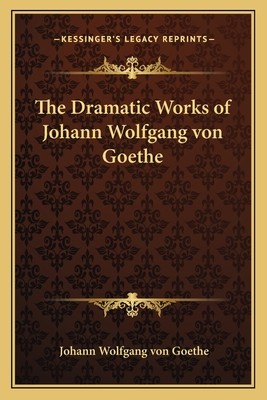
- We will send in 10–14 business days.
- Author: Johann Wolfgang von Goethe
- Publisher: Kessinger Publishing
- ISBN-10: 1162731052
- ISBN-13: 9781162731056
- Format: 15.2 x 22.9 x 3.1 cm, softcover
- Language: English
- SAVE -10% with code: EXTRA
The Dramatic Works of Johann Wolfgang Von Goethe (e-book) (used book) | bookbook.eu
Reviews
Description
1850. Goethe is widely recognized as the greatest writer of the German tradition. The Romantic period in Germany is known as the age of Goethe, and Goethe embodies the concerns of the generation defined by the legacies of Rousseau, Kant, and the French Revolution. His eminence is derived not only from his literary achievements as a lyric poet, novelist, and dramatist but also from his often significant contributions as a scientist (geologist, botanist, anatomist, physicist, historian of science) and as a critic and theorist of literature and of art. This volume contains some of his most noted works including: Faust; Iphigenia in Taurus; Torquato Tasso; Egmont; and Goetz von Berlichingen, Sir Walter Scott's Introduction. See other titles by this author available from Kessinger Publishing.
EXTRA 10 % discount with code: EXTRA
The promotion ends in 20d.19:01:59
The discount code is valid when purchasing from 10 €. Discounts do not stack.
- Author: Johann Wolfgang von Goethe
- Publisher: Kessinger Publishing
- ISBN-10: 1162731052
- ISBN-13: 9781162731056
- Format: 15.2 x 22.9 x 3.1 cm, softcover
- Language: English English
1850. Goethe is widely recognized as the greatest writer of the German tradition. The Romantic period in Germany is known as the age of Goethe, and Goethe embodies the concerns of the generation defined by the legacies of Rousseau, Kant, and the French Revolution. His eminence is derived not only from his literary achievements as a lyric poet, novelist, and dramatist but also from his often significant contributions as a scientist (geologist, botanist, anatomist, physicist, historian of science) and as a critic and theorist of literature and of art. This volume contains some of his most noted works including: Faust; Iphigenia in Taurus; Torquato Tasso; Egmont; and Goetz von Berlichingen, Sir Walter Scott's Introduction. See other titles by this author available from Kessinger Publishing.


Reviews